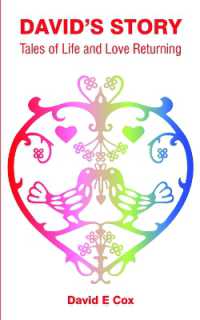- ホーム
- > 洋書
- > 英文書
- > Psychology
Full Description
Theory of Mind Development in Context is the first book of its kind to explore how children's environments shape their theory of mind and, in turn, their ability to interact effectively with others. Based on world-leading research, and inspired by the ground-breaking work of Candida Peterson, the original collected chapters demonstrate that children's understanding of other people is shaped by their everyday environment. Specifically, the chapters illustrate how theory of mind development varies with broad cultural context, socioeconomic status, institutional versus home rearing, family size, parental communication style, and aspects of schooling. The volume also features research showing that, by virtue of their condition, children who are deaf or who have an autism spectrum disorder function in environments that differ from those of typical children and this in turn influences their theory of mind.
Although much important research has emphasized the role of nature in theory of mind development, this book highlights that children's understanding of other people is nurtured through their everyday experiences and interactions. This perspective is essential for students, researchers, and practitioners to gain a complete understanding of how this fundamental skill develops in humans. The book is invaluable for academic researchers and advanced students in developmental psychology, education, social psychology, cognitive psychology, and the social sciences, as well as practicing psychologists, counselors, and psychiatrists, particularly those who deal with disorders involving social and/or communicative deficits.
Contents
Introduction: how should we conceptualise contextual influences on young children's theory of mind development? 1. Learning a theory of mind Part I: Social contexts for development 2. Culture and the sequence of developmental milestones toward theory of mind mastery 3. Family influences on theory of mind: a review 4. Why Montessori is a facilitative environment for theory of mind: three speculations 5. Behaviour to beliefs Part II: Atypical developmental contexts 6. The role of institutionalization in theory of mind 7. The empathic mind in children with communication impairments: the case of children who are deaf or hard of hearing (DHH); children with an autism spectrum disorder (ASD); and children with specific language impairments (SLI) 8. Environment and language experience in deaf children's theory of mind development 9. Mindreading as a transactional process: insights from autism Appendix: standard theory of mind tasks







